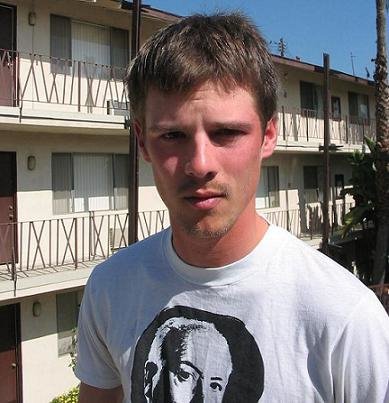THX 1138 (1971)
Director: George Lucas
Starring: Robert Duvall, Donald Pleasence, Don Pedro Colley, Maggie McOmie
THX 1138 is touted as Lucas' first feature length film, I believe. While a fascinating study of a bleak future of capitalism, sedatives and assembly line mentality from the micro to the macro, THX's gets lost in its own fractured structure. Ironically, the film itself handles its characters much in the same way the system handles the human beings in the film: coldly and dismissively. In a film whose statement (presumably) is that the future it portrays is a negative one, even the main characters in the film are just fodder so we can get to the next major setpiece.
Despite a complete disinterest in the characters, the film is visually gorgeous and uses sound in some very interesting ways. I saw the new remastered edition of THX with the extra digital effects (the same kind of thing they did when they re-released the Star Wars trilogy in theaters) and with digital projection. The film looked absolutely spectacular with its very sparse, sterile aesthetic.
The strange thing about the sound is that it's often coming from elsewhere in the frame or from "behind" the viewer. For example, a major component of the film's aesthetic is of spying on people using security cameras mounted in every part of the film's world. So while the camera watches a video monitor, the diegetic sound actually comes from unseen people in the room also presumably watching the monitor, though we only see--never hear--these other people. In fact, most of the soundtrack is seemingly senseless radio chatter discussing the images displayed on screens (on the monitors) and literally on the movie screen. It's actually a pretty ingenious way to alienate the view from any human being on screen by letting us see the ones farthest from us through another generation of medium (the monitors) and only allowing us to hear those people who should be spacially closest to us. Unfortunately, this is a good way to distance the viewer emotionally from any kind of story or connection one might form with the characters.
I almost feel like this line of thinking coincides with one sub-plot of the movie: the digital Jesus plotline. Though religion is spurned in the Communist totalitarian system, it is altered so that it is just a section of the system in THX. Users go into phone booth-like enclosures, kneel down before a picture of Jesus, and admit all of the ways they made mistakes while working on the assembly line. Meanwhile, the picture lights up and--no matter what ghastly things the user says about his or her own life--the voice from the picture responds with pre-recorded: "Uh-huh", "Yes", "Excellent", "Could you be more...specific?", etc. Later in the movie, one of the characters finds the studio where they film and transmit the image and sound of the digital religion. A monk comes up to the character and quickly tries to usher him out. "This isn't what you're looking for. You can't do that here." I almost feel like I'm looking for real characters in the film, but when I get too close the film pushes me away saying, "What are you doing? You can't find characters here. Look over there: a high speed chase! Through tunnels!"
If you can appreciate a film based only on its aesthetic merit, however, you'll want to check out the remastered edition of THX 1138, paying particular attention to the added CGI graphics (you'll know) and the interesting use of sound.
September 11
Arclight Theaters, evening
D


0 Comments:
Post a Comment
<< Home